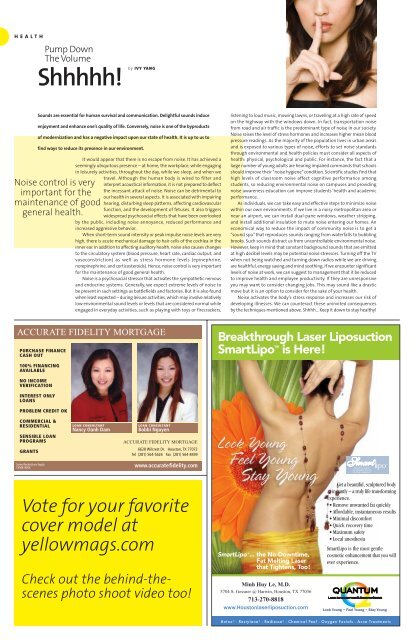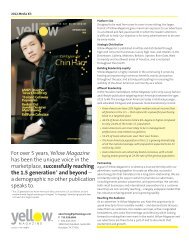Yellow Magazine Cover Model Contest Tasting Bourbon and ...
Yellow Magazine Cover Model Contest Tasting Bourbon and ...
Yellow Magazine Cover Model Contest Tasting Bourbon and ...
You also want an ePaper? Increase the reach of your titles
YUMPU automatically turns print PDFs into web optimized ePapers that Google loves.
H E A L T H<br />
Pump Down<br />
The Volume<br />
Shhhhh!<br />
by IVY YANG<br />
Sounds are essential for human survival <strong>and</strong> communication. Delightful sounds induce<br />
enjoyment <strong>and</strong> enhance one’s quality of life. Conversely, noise is one of the byproducts<br />
of modernization <strong>and</strong> has a negative impact upon our state of health. It is up to us to<br />
find ways to reduce its presence in our environment.<br />
Noise control is very<br />
important for the<br />
maintenance of good<br />
general health.<br />
It would appear that there is no escape from noise. It has achieved a<br />
seemingly ubiquitous presence – at home, the workplace, while engaging<br />
in leisurely activities, throughout the day, while we sleep, <strong>and</strong> when we<br />
travel. Although the human body is wired to filter <strong>and</strong><br />
interpret acoustical information, it is not prepared to deflect<br />
the incessant attack of noise. Noise can be detrimental to<br />
our health in several aspects. It is associated with impairing<br />
hearing, disturbing sleep patterns, affecting cardiovascular<br />
function, <strong>and</strong> the development of fetuses. It also triggers<br />
widespread psychosocial effects that have been overlooked<br />
by the public, including noise annoyance, reduced performance <strong>and</strong><br />
increased aggressive behavior.<br />
When short-term sound intensity or peak impulse noise levels are very<br />
high, there is acute mechanical damage to hair cells of the cochlea in the<br />
inner ear. In addition to affecting auditory health, noise also causes changes<br />
to the circulatory system (blood pressure, heart rate, cardiac output, <strong>and</strong><br />
vasoconstriction) as well as stress hormone levels (epinephrine,<br />
norepinephrine, <strong>and</strong> corticosteroids). Hence, noise control is very important<br />
for the maintenance of good general health.<br />
Noise is a psychosocial stressor that activates the sympathetic nervous<br />
<strong>and</strong> endocrine systems. Generally, we expect extreme levels of noise to<br />
be present in such settings as battlefields <strong>and</strong> factories. But it is also found<br />
when least expected – during leisure activities, which may involve relatively<br />
low environmental sound levels or levels that are considered normal while<br />
engaged in everyday activities, such as playing with toys or firecrackers,<br />
Vote for your favorite<br />
cover model at<br />
yellowmags.com<br />
Check out the behind-thescenes<br />
photo shoot video too!<br />
listening to loud music, mowing lawns, or traveling at a high rate of speed<br />
on the highway with the windows down. In fact, transportation noise<br />
from road <strong>and</strong> air traffic is the predominant type of noise in our society.<br />
Noise raises the level of stress hormones <strong>and</strong> increases higher mean blood<br />
pressure readings. As the majority of the population lives in urban areas<br />
<strong>and</strong> is exposed to various types of noise, efforts to set noise st<strong>and</strong>ards<br />
through environmental <strong>and</strong> health policies must consider all aspects of<br />
health: physical, psychological <strong>and</strong> public. For instance, the fact that a<br />
large number of young adults are hearing impaired comm<strong>and</strong>s that schools<br />
should improve their “noise hygiene” condition. Scientific studies find that<br />
high levels of classroom noise affect cognitive performance among<br />
students, so reducing environmental noise on campuses <strong>and</strong> providing<br />
noise awareness education can improve students’ health <strong>and</strong> academic<br />
performance.<br />
As individuals, we can take easy <strong>and</strong> effective steps to minimize noise<br />
within our own environments. If we live in a noisy metropolitan area or<br />
near an airport, we can install dual-pane windows, weather stripping,<br />
<strong>and</strong> install additional insulation to mute noise entering our homes. An<br />
economical way to reduce the impact of community noise is to get a<br />
“sound spa” that reproduces sounds ranging from waterfalls to bubbling<br />
brooks. Such sounds distract us from uncontrollable environmental noise.<br />
However, keep in mind that constant background sounds that are emitted<br />
at high decibel levels may be potential noise stressors. Turning off the TV<br />
when not being watched <strong>and</strong> turning down radios while we are driving<br />
are healthful, energy saving <strong>and</strong> mind soothing. If we encounter significant<br />
levels of noise at work, we can suggest to management that it be reduced<br />
to improve health <strong>and</strong> employee productivity. If they are unresponsive<br />
you may want to consider changing jobs. This may sound like a drastic<br />
move but it is an option to consider for the sake of your health.<br />
Noise activates the body’s stress response <strong>and</strong> increases our risk of<br />
developing illnesses. We can counteract these uninvited consequences<br />
by the techniques mentioned above. Shhhh… Keep it down to stay healthy!













